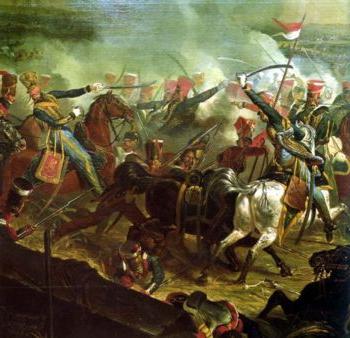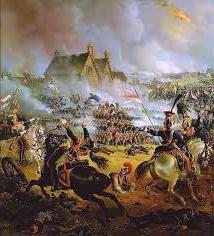The Battle of Waterloo took place on June 18, 1815 between the combined army of European states (England, the Netherlands, Prussia) and the troops of Napoleon Bonaparte. The tiny Waterloo, an ordinary Belgian place near Brussels, not only went down in history, but also became a sign of an insulting loss, an unfortunate defeat; and this is true - because under Waterloo Napoleon suffered the only unconditional defeat in his military career.
The Battle of Waterloo was the culmination, the completion of the famous Napoleonic "100 days"; after this defeat all claims
Bonaparte's creation of a world empire is a thing of the past. Moreover, he did not manage to even remain “just” the French emperor.
After the extremely unsuccessful military companies of 1812-1814, Napoleon was forced to accept all the conditions of the victorious countries (Prussia, Sweden, Britain, the Russian Empire), abdicate and go to an honorable exile to the Mediterranean island of Elba. But even there, far from the turbulent European events, Bonaparte did not give up hope of returning to France, “taking a break”, and again becoming an active politician. March 1, 1815, the emperor landed on the coast of France, from this day 100 days of Napoleon are counted. In just a few days, Bonaparte made his way from Cannes to Paris, everywhere meeting an enthusiastic reception and a demonstration of devotion (the soldiers of the old Napoleonic guard were especially loyal to the sovereign). Louis Bourbon, who ruled France after the abdication of the emperor Napoleon, fled abroad with his court.

All this adventurous venture alarmed the European monarchs in earnest. It was decided to put an end to the twenty-year era of continuous Napoleonic wars and finally deliver a crushing blow to the Corsican upstart. The Seventh Coalition of European States (Austria, Russia, Britain, Prussia) was organized, this time directed not against France, but against Napoleon personally. Emperor Bonaparte was outlawed. It was decided to put up a combined army against the French troops, the total number of which reached a million people. The gradual concentration of the allied forces took place in late spring - early summer 1815 in Belgium, along the eastern borders of France. Part of the Allied forces was to come from Northern Italy.

This truly cyclopean army was opposed by Napoleon relatively small forces (up to 300,000 people). His army lacked not only ordinary soldiers, but also officers; the Battle of Waterloo ended in an unfortunate defeat, including due to confusion in the management of the army, unjustified personnel appointments.
The Battle of Waterloo began in the early hours of June 18, 1815, with the French army attacking Ugumon Castle. Their main goal - to disorganize the English formations under the command of Wellington - was not achieved by the French. On the contrary, all distracting maneuvers inflicted tangible damage to the imperial army itself.
The numerical superiority of the Allied forces, the poor organization and management of the Napoleonic army, the wrong tactics - all this led to the crushing defeat of the French army. The Battle of Waterlow has become one of the most bloody battles in world history: the total number of victims reached 16,000 people killed and about 70,000 - wounded.
After the defeat, Napoleon was forced to surrender to his worst enemies - the British. He was forced to abdicate a second time and sent back to exile, this time to the distant island of St. Helena. The Battle of Waterloo was the last battle to complete the era of the Napoleonic Wars.